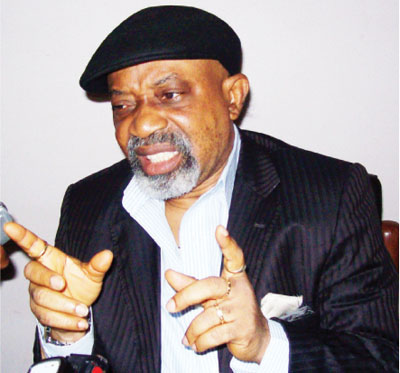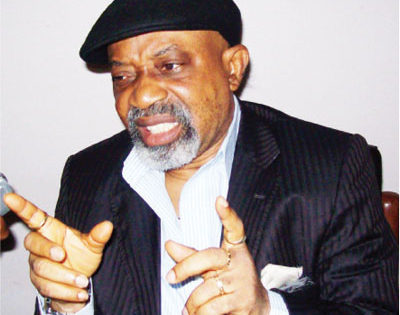
 The current economic realities leading to the deregulation of the downstream sector have made it more rational for government to consider increase in the salaries of the nation’s workers in the public, and even the private, sector of the economy.
The current economic realities leading to the deregulation of the downstream sector have made it more rational for government to consider increase in the salaries of the nation’s workers in the public, and even the private, sector of the economy.
But how realistic and justifiable will it be for public servants to shun corruption without better take-homes? The bane of corruption in the public service has been traced to insufficient, irregular and disparities in salaries of workers from sector to sector in different states of the federation.
For instance, some oil workers, bankers, federal workers in the ministries, agencies and agencies (MDAs) earn salaries above N150, 000 monthly, while their colleagues working as primary and secondary school teachers earn less than N70, 000.
For private sector workers, huge disparities are observed in their wages due to lack of policies by government, corruption and poor economic growth.
Reports say civil servants working in many ‘high profile’ MDAs of the Federal Government receive salaries above their counterparts in ‘low profile organisations.’
The minimum wage issue is traceable to democratic settings than the military era. The agitations and demands for upward review of workers’ wages date back to 1945. This followed the 45-day general strike by Nigerian workers between 1945 for a ‘Cost of Living Allowance’ (COLA) and 2007 when the workers achieved their demand for a 25% general wage rise via the Ernest Shonekan Wage Consolidation Committee, but which was capriciously reduced to 15% by former President Olusegun Obasanjo.
Nigerian workers have since then struggled more than 15 times to have improved wages and legislation for national minimum wage.
It would be recalled that after a report of an internal committee appropriated to work out the modalities for appropriate minimum wage in December 2008, the Nigeria Labour Congress (NLC) leaders publicly demanded for N52, 200 minimum wages for workers. Thus, the demand of the Labour union was tabled in February 2009, making the administration of President Goodluck Jonathan to approve a minimum wage of N18, 000. But up till date some states are yet to comply with the regulation.
The majority of the governors claim that their resources and allocations from federation account every month are not enough to handle their workers’ remunerations.
However, the allowances of political office holders, which in mouth-watering figures, are paid regularly. For instance, 26 of the 36 governors currently owe workers’ salaries despite the hardship economic situations.
The removal of subsidy on Premium Motor Spirit (PMS), popularly called petrol, last month by the government has made the Organised Labour press government further on the need to increase workers’ minimum wage.
Recently, Labour leaders proposed N56, 000 as minimum wage for public service workers, but government’s argument has been very controversial. It argued that it cannot afford the amount proposed by Labour and that if it would consider salary increase, certain percentage of public servants have to be relieved of their jobs.
Analysts are of the opinion that if politicians can continue to have the basic allowances without stress, civil servants should be effectively paid to reduce the corruption attributed to the public sector.
Clearly, the call by the NLC and the Trade Union Congress (TUC) to review workers’ salaries does not actively involve the private sector that has remained adamant to the minimum wage regulations for so long. Private workers, with years of experience in different fields, are paid less than N50, 000 monthly by some firms in the country.
Economic Confidential gathered that telecoms firms have resorted to hiring workers through contracts, to prevent them from promotions and increase of allowances.
Today, the prices of commodities have hit the roof-tops even as the hike in fuel price due to new tariff regime for petrol has contributed to high prices of consumables and others.
One important observation is that for Nigerian workers to shun corrupt practices, realistic salaries have to be provided with the current economic realities.
The inflation data released in April indicated a 13.7 digit and that has relegated the value of the current N18, 000 minimum wage to mere peanuts, following high cost of goods and services. The high inflation figure has greatly reduced the purchasing power of Nigerians.
Meanwhile, the factionalisation of the Organised Labour has made it possible for the Federal Government to call the bluff of Labour as was evident in the recent strike in the aftermath of the increase in the pump price of PMS to N145 per litre. The two factions headed by Comrade Ayuba Wabba and Comrade Joe Ajaero are not on the same page in national matters.
In April, the NLC proposed a new minimum wage of N56, 000 to the Federal Government. Wabba said Labour proposed the new wage as the law makes provisions for the review of minimum wage, especially at the period when Nigerian economy was in a bad shape.
According to him, minimum wage was designed to ensure that workers were not made to earn below what should sustain them at both private and public institutions. Wabba said the Federal Government has to take issue of the minimum wage seriously if the fight against corruption is succeed.
The current wage of N18, 000 was negotiated at the time naira’s exchange rate to a dollar was N100 to $1 during former President Jonathan’s administration, but that is no longer the situation today. But the Federal Government said the demands are being studied.
Minister of Labour and Employment, Dr Chris Ngige, said the government “is painstaking considering the demands.”
He said: “The demand by Labour for the review of the minimum wage is a legitimate request which the federal government is carefully studying and appropriately responded to, we shall all sit down because what the Labour is asking for is the re-negotiation of an existing Collective Bargain Agreement (CBA).We shall advise the government the way such a tripartite negotiation will be handled for everybody to be satisfied without any industrial unrest.”
Ngige said Labour is part of the tripartite arrangement of the International Labour Organisation structure which Nigeria is signatory to. However, NLC after suspending its five-day-old strike over increase in the price of petrol had said it will not be part of the palliative committee set-up by the government to cushion the effect of the current economic hardship in the country.
Government says it cannot afford the N56, 000, proposed by Labour, rather may consider N45, 000. Already, the commodity market is in double digits due to the high inflation rate.
How will the new minimum wage affect the lives of the common man? School owners are already increasing their fees; artisans are also increasing their charges. As long as it is good for government to increase worker’s pay, it also needs to ensure that the palliatives provided in the 2016 budget are properly implemented in the interest of especially the vulnerable Nigerians.
